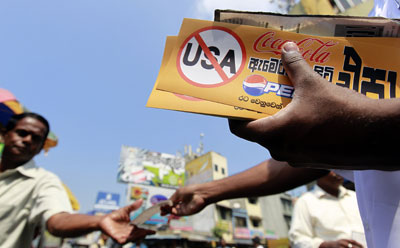On Thursday and Friday, we wrote about the ugly government backlash to last week’s U.N. Human Rights Council resolution calling for an investigation into Sri Lanka’s alleged abuses of international humanitarian law during its war with Tamil separatists.
That campaign of intimidation continues: In the magistrate’s court where Sandhya Eknelygoda has been trying to gain any information about the whereabouts of her husband, Prageeth, who disappeared on January 24, 2010, she came under harsh questioning — observers at the court called it intentionally intimidating — from government lawyers about her presence at the UNHRC in Geneva. Before she returned home from Switzerland, her name had been denounced in the government-controlled media as one of the government’s critics — several of whom have been denounced as “traitors.”
Eknelygoda told colleagues in Colombo that Monday’s entire court session was about how she went to Geneva, who funded her trip, why she betrayed her country, and how much she was paid to do that. Her lawyer objected to the line of questioning, but was overruled, she said.
When she had returned home on Sunday from Geneva, she told reporters, “I only wanted to bring the disappearance of my husband to the notice of the international community. But, those who are allied with the government insulted me, saying I went there to betray the country,” she said. You can see a video report of her statement on YouTube.
Eknelygoda and her two teenage sons have been waging a quiet but steadfast campaign to pressure the government for information about their husband and father. CPJ and four other media support groups wrote to U.N. Secretary-General Ban Ki-moon in March 2011, asking for his intervention in the case. Ban referred the issue to the U.N. High Commissioner for Human Rights and UNESCO, where it has been allowed to languish, despite pleas from Eknelygoda and her supporters.
Nor has a January 2012 ruling by Sri Lanka’s Appeal Court that former Attorney General Mohan Peiris could be called in as a witness into the disappearance of Eknelygoda been acted on. In a November 2011 posting, “Sri Lanka’s savage smokescreen,” CPJ reported that Peiris told the Asian Human Rights Commission that Eknelygoda had taken refuge in a foreign country and that the campaign against his disappearance is a hoax, although he failed then and ever since to provide detailed information about where Eknelygoda had fled.
At the time, CPJ said that Peiris’s statements “do more than point up the government’s indifference to Eknelygoda’s fate and the mental anguish of his wife and two sons. Peiris’s statements highlight the disregard with which the government views international opinion.”
Given the response in the government-controlled media following last week’s Geneva vote, that indifference and disregard have moved on to outright hostility.
